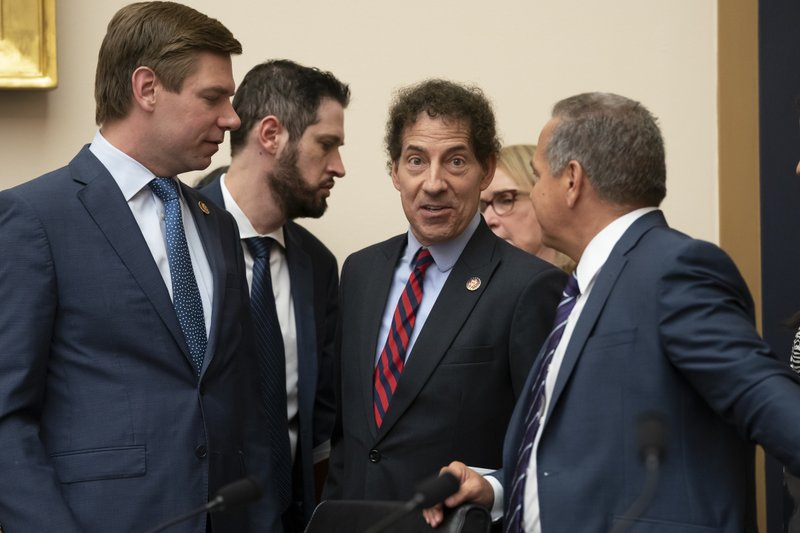WASHINGTON -- Members of both parties on Tuesday suggested legislation may be necessary for the U.S. news industry as lawmakers began a bipartisan investigation into the market dominance of Silicon Valley companies.
At a hearing of the House Judiciary Committee's antitrust panel, news media associations accused the tech companies of jeopardizing the news industry's economic survival by putting out news content on their platforms without fairly compensating them for it.
"This is the first significant antitrust investigation undertaken by Congress in decades," Rep. David Cicilline, D-R.I., the subcommittee's chairman, said at the start of the hearing. The investigation is long overdue, he said, and Congress must determine whether the antitrust laws "are equipped for the competition problems of our modern economy."
Cicilline noted the steep layoffs in the news industry in recent years, saying the dominant position of the online platforms in the advertising market has created "an economic catastrophe for news publishers, forcing them to cut back on their investments in quality journalism." At the same time, he said, tech platforms that are gateways to news online "have operated with virtual immunity from the antitrust laws."
As a partial solution, Cicilline proposed legislation to establish an antitrust exemption that would allow news companies to band together to negotiate revenue rates with big tech platforms. He called it "a life support measure, not the remedy for long-term health" of the news business.
The senior Republican on the full committee, Rep. Doug Collins of Georgia, said he backs Cicilline's proposal. Addressing the broader question of antitrust, however, he said, "Big is not necessarily bad," adding that lawmakers need to proceed cautiously.
"The marketplace for news is broken," News Corp.'s general counsel, David Pitofsky, said in his prepared remarks. He criticized what he described as "free-riding by the dominant online platforms," which he said have diverted advertising dollars away from the companies that created the content and into their own coffers.
Rupert Murdoch, an ally of President Donald Trump, owns News Corp., which holds media and broadcasting properties including The Wall Street Journal, the New York Post, Fox News and publisher HarperCollins.
The head of an association that represents technology and telecom companies said the government scrutiny of successful companies is appropriate. However, an antitrust exemption for the news industry wouldn't solve the problem, said Matt Schruer, vice president of the Computer and Communications Industry Association.
Before the Internet, "news publishers received an exemption to deal with previous competitors like radio and TV news [and they] have not worked," Schruer said. "The results were fewer choices for readers and less competition among news outlets."
Atlanta Journal-Constitution Editor Kevin Riley emphasized the need for local journalism to thrive by pointing to his newspaper's years-long coverage of the Atlanta public schools cheating scandal, in which teachers and administrators were found to have received bonuses based on bogus student test scores.
"Too often, the debate about media and tech platforms is framed within a discussion of international news brands," he said in prepared remarks. "But the greatest peril for our nation lurks at the local level, where a regional or community paper must cope with a fast-changing technological and financial landscape."
Stepping ahead of the criticism, Google's vice president of news, Richard Gringas, said the company has "worked for many years to be a collaborative and supportive technology and advertising partner to the news industry."
"Every month, Google News and Google Search drive over 10 billion clicks to publishers' websites, which drive subscriptions and significant ad revenue," he said in a statement Tuesday.
With regulators at the Justice Department and Federal Trade Commission apparently pursuing antitrust investigations of Facebook, Google, Apple and Amazon, and several state attorneys general exploring bipartisan action of their own, the tech industry finds itself in a precarious moment. Cicilline has flatly called them monopolies.
Several Democratic presidential candidates think they have the solution: breaking up the companies on antitrust grounds. Cicilline has called that "a last resort," but the idea has currency with both major political parties, including at the White House.
Trump noted the huge fines imposed by European regulators on the biggest tech companies.
"We are going to be looking at them differently," he said in an interview Monday on CNBC.
"We should be doing what [the Europeans] are doing," Trump said. "Obviously, there is something going on in terms of monopoly."
The tech giants have mostly declined to comment on the antitrust investigations.
Google has said that scrutiny from lawmakers and regulators "often improves our products and the policies that govern them," and that in some areas, such as data protection, laws need to be updated.
Facebook executives have been calling broadly for regulation while explicitly rejecting the idea of breaking up "a successful American company." Chief Executive Officer Mark Zuckerberg has called for new rules in four areas: harmful content, election integrity, privacy and data portability.
Information for this article was contributed by Marcy Gordon of The Associated Press and by Naomi Nix of Bloomberg News.
Business on 06/12/2019
